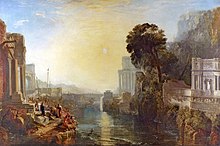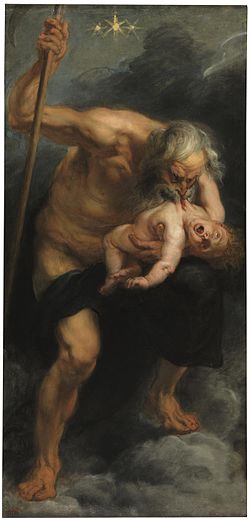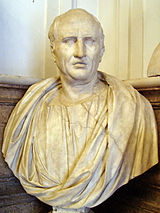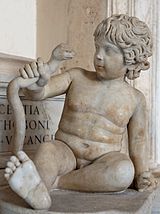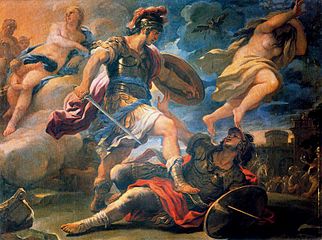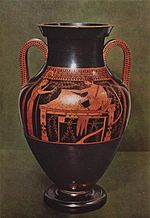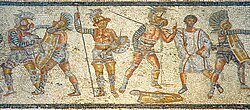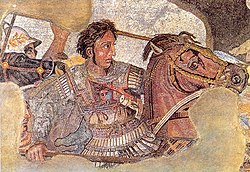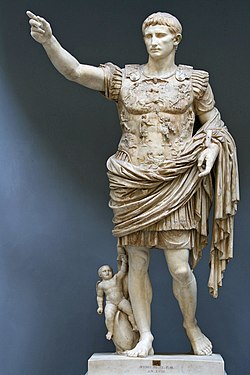Albany Senior High School/Coursebook/3CLA
e
Contents
Classical Studies Level 3 2019
Classical Studies is the study of Ancient Greece and Rome. It is a "multi-disciplinary" subject. This means that it looks at many things including archaeology, history, literature, & philosophy.
You do not need to have studied classical studies before to pick it up. A strong background in history, geography, or art history is advantageous. Strong reading skills and enthusiasm are usually the most important ingredients for success.
___________________________________________________________________________________________________________________________________________________________________________________
Why Study Classics?
Classical studies trains you to read difficult primary texts and to think about them critically. It is based around core thinking skills & will significantly develop your ability to communicate persuasively & with clear purpose in speech or on paper.
Classical studies is an ideal subject for careers involving a high level of critical thinking & literacy skills, including law, policy, or journalism.
Classical Studies is a University Entrance Approved Subject (you must pass an external for this)
Classical Studies is a University of Auckland Table A Subject
All level 3 Classical Studies standards count towards university literacy requirements for reading.
All level 3 External Classical Studies standards count towards university literacy requirements for writing.
12 Internal Credits are Available
10 External Credits are Available
What will we study in 2019?
Topic 1: Classics through time
In this unit you will explore how the classical world has influenced other cultures through time. We explore:
Gods and heroes through time. In this topic you will self-select your own mythological case studies and examine how they have influenced other cultures through time. .
Topic 2: Ideology
Classical ideologies are ancient belief systems relating to politics, philosophy, or religion.
We look at Alexander the Great. Looking closly at his relationships with different groups of people. as well as his great feats.
Topic 3: External
Alexander the Great as a case study. What was the impact Alexander had on Ancient Greece and Persia.
Topic 4: External
Classical literature.
2) Classical Literature: Virgil's Aeneid. Using Virgil's Aeneid and the cultural and political background of the early Roman Empire, we will look closely at the Ideas and Values of the Ancient world.
Internal Assessment Opportunities (12 Credits)
AS91398 3.5Demonstrate understanding of the lasting influences of the classical world on other cultures across time
6 Credits
Topic: Mythology - god case study.
This assignment is due TBA
AS91397 3.4
Demonstrate Understanding of Significant Ideologies in the classical world
6 Credits
Topic: ancient Greek history through the influence of Alexander the Great.
This assignment is due TBA
External Assessment Opportunities (10 Credits)
AS91396 3.3Analyse the impact of a significant historical figure on the classical world'
6 Credits
Alexander the Great
AS91394 3.1
Analyse ideas and values of the classical world
4 Credits
Virgil's Aeneid.
Scholarship 2019 (93404)
This can be based on an individual program & if there are enough people interested we will run regular workshops.
If you want to know more about the scholarship exams, go to the following link: https://docs.google.com/a/ashs.school.nz/document/d/1LXuAFVXLPelRlQMeN5MOshleGFL6HqnhrVrw7o1P4bU/edit?usp=sharing
In this difficult exam, you will use your knowledge of classical studies to demonstrate your ability to think critically about the ideas and values of the classical world. You will learn to communicate your understanding through the use of primary and secondary source evidence in a range of integrated contexts, which may include history, literature, philosophy, architecture and / or art.
Scholarship classical studies is divided into two sections.
Section A includes the first two parts of the exam. It is based upon seven topics with two questions for each topic and you are expected to answer in an essay format. You are required to answer a question on two different topics. The main topics we will focus on are the comedy of Aristophanes & Alexander the Great. You might choose Socrates, Virgil, & Augustus as an alternative.
Section B includes four resource booklets with questions and you must select one of these to answer on. These are based on two themes: Theme A is Culture and Identity, with specific focus on death and the afterlife; and Theme B is Conflict, with specific focus on attitudes to war. For each theme there is a separate Greek and Roman booklet and you choose one.
We will negotiate which contexts you would like to study and we can aim to integrate these into your internal and external assessments as much as possible. At present, the most likely contexts are Aristophanes, Augustus, Virgil, Socrates, and Alexander the Great.
A High level of performance includes:
• analysis and critical thinking
• integration, synthesis, and application of highly developed knowledge, skills, and understanding to complex situations
• logical development, precision and clarity of ideas.
An Outstanding level of performance includes a sustained manner of:
• perception and insight
• sophisticated integration and abstraction
• independent reflection and extrapolation
• convincing communication.
What Standards can I take?
Core Program
| NCEA Level |
Standard Number |
Name of Standard |
Version Number |
Credits | Reading | Writing | Assessment |
|---|---|---|---|---|---|---|---|
| Level 3 | AS91397 | Classical Studies 3.4: Demonstrate understanding of significant ideology(ies) in the classical world | Version 2 | 6 Credits | Yes | No | Internal |
| Level 3 | AS91398 | Classical Studies 3.5: Demonstrate understanding of the lasting influences of the classical world on other cultures across time | Version 2 | 6 Credits | Yes | No | Internal |
| Level 3 | AS91394 | Classical Studies 3.1: Analyse ideas and values of the classical world. | Version 2 | 4 Credits | Yes | Yes | External |
| Level 3 | AS91396 | Classical Studies 3.3: Analyse the impact of a significant historical figure on the classical world | Version 2 | 6 Credits | Yes | Yes | External |
Vocational Pathways provide a framework for students to show how their learning and achievement is valued in the workplace by aligning learning to the skills needed for industry. Follow this link to see the profile for this course.
Frequently asked questions
Do I need to have studied classical studies before?
No. The majority of students who take classical studies have not taken it before. However, being a strong reader is extremly beneficial. Research and writing skills are also useful. In particular, previous experience taking art history, history or geography is also useful (not English).
Is there lots of reading and writing?
There is a substantial amount of reading to complete and it is also very difficult reading through ancient texts in translation. You will also be expected to have strong essay writing skills. If you intend to go to university, these are both essential skills that you will need to work on.
What if there is something I am really interested in but it is not offered?
In classical studies, every student has the opportunity to "break out" if they choose to. This means that if there is a topic that you really want to do, you can negotiate with Nic to see if it fits well with the assessment and if we can provide appropriate resources.
Welcome to Classical Studies!
If you have any questions contact Katherine Mathis kmathis@ashs.school.nz.
